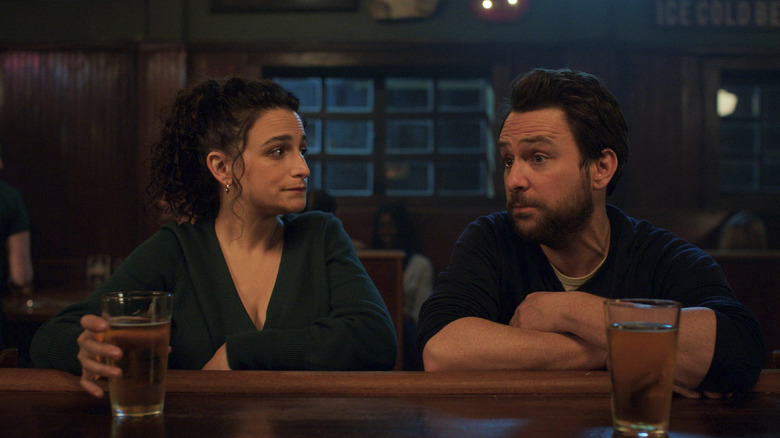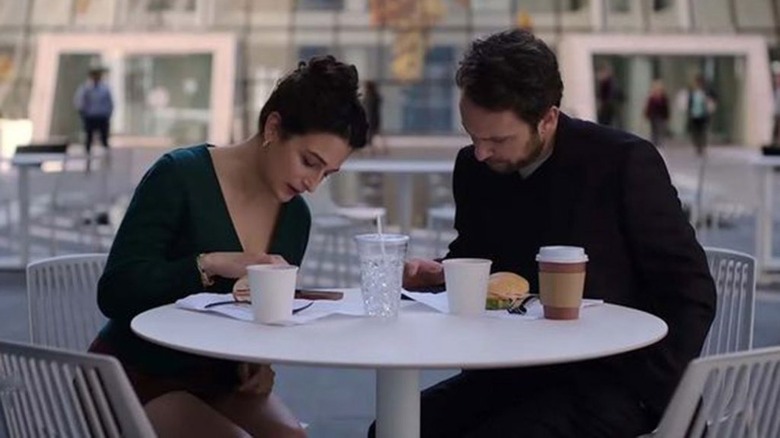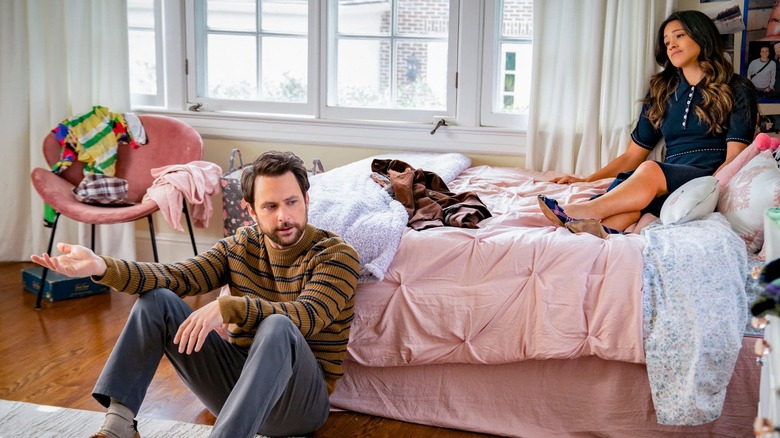I Want You Back Writers Isaac Aptaker And Elizabeth Berger Embrace Flaws In Their Rom-Com [Interview]
Isaac Aptaker and Elizabeth Berger are a busy duo. Over the past few years alone, they've become showrunners on "This is Us," steered the ship on "Love, Victor," and created "How I Met Your Father." On the feature film side, the duo also wrote "Love, Simon" and the charming new romantic comedy, "I Want You Back," which stars Jenny Slate and Charlie Day. Aptaker and Berger, both longtime friends and collaborators from college, know how to craft a charming rom-com.
With "I Want You Back," the duo take a fairly dark premise — two jealous former lovers try to ruin their exes' new relationships — and bring a nice and light touch to it. For the screenwriters, it was about characters trying their best, not their worst, in order for the story to work. "Everyone is sort of leading from a good place and trying their best," Berger said. "They're making a lot of ridiculous mistakes and you might think to yourself, 'Oh my God, why are they doing that? No one should do that.' But you never think, 'Oh, they're bad. Or they're leading from a place of trying to really hurt someone.' They're just kind of floundering and trying to find their way." Recently, the pair talked to us about crafting their warmly embraced romantic comedy, as well as their years of collaboration.
'Jack Nicholson in 'As Good As It Gets' is a monster, he tried to kill a dog.'
Did you like the idea of seeing how far these characters could go with their scheme without losing the audience?
Isaac: For this one, we lucked out with this cast. Jenny and Charlie ooze charisma, and that lets the characters get away with some pretty bad behavior because you're just hopefully enjoying spending time with them. But for us, we love movies where you feel like you're watching people that you could know. Hopefully, it's relatable enough that it's like you're watching your funniest friends do something. I think that was always the goal, that it's just grounded enough and that the actors are bringing that relatability to it that you feel like you're watching people you could run into at a bar.
Elizabeth: Yeah. And you're watching people that are flawed like you and your friends. They aren't bad people, but you could see your friend doing that in bad circumstances and you'd try and stop them and they'd say, "No, I know what I'm doing." And you'd be like, "Oh God, I don't think you do." But again, no one's a bad guy and I think people recognize those flaws and they lean in and they like you because they see that you're trying at the end of the day.
How was it finding that tone for a romantic comedy? You want honest moments, but you also expect some comedy that goes a little big, right?
Isaac: That's one of the hardest things. I think our director, Jason Orley, did such a good job with that. We really looked at some of the older, romantic comedies, like "When Harry Met Sally" and the old Jim Brooks movies and what they did with character, and tried to bring that into a movie with a really big premise. Because you hear, like, "Oh, two people team up to break up their exes' new relationships." That's a big idea for a movie. So we said, "What if you take that big idea and then try as much as possible to bring it down to earth through character?"
Elizabeth: And again, it is a testament to our actors because we have people that can make you laugh so hard and then seconds later, really make you emotionally connected to them. And that's just their gift and their genius and they were able to strike that perfect balance.
Since you mentioned James L. Brooks, who means so much to writers, what does his work mean to you both?
Isaac: I think people or writers love him because the characters are just so well drawn and specific. And like we were talking about, they're flawed. Jack Nicholson in "As Good As It Gets" is a monster, he tried to kill a dog. He's an assh*le, but you want to watch him become a better man and so you go on that journey. I think James L. Brooks movies are never afraid to let a character be rough around the edges.
Are there many differences for you both writing comedy for TV versus film?
Elizabeth: I think with this film, it's just that thing of having more time to let things breathe. More space so you can go on these sort of longer runs than necessarily you'd go on if you knew that you had 25 minutes to tell your story. So that's really freeing and really fun. I think that would be the main difference for me.
Since you both have the discipline of working in TV, how fast do you usually write features?
Isaac: Oh, writing a feature is so much fun. Also, writing something that has an ending. I mean, in television, you're telling a story for years and years and years and you want to keep it open-ended and always have an engine for more story. So you're never really able to wrap things up, because you're always trying to start new arcs and what have you. So being able to sit down and go, "This is going to be 110 pages. I know how it ends. I know what the middle is," it's such a nice way to approach something.
Elizabeth: And there is that part of the process where the pace is much slower when it's just us figuring it out and then doing our writing process. It is very nice. Then it gets fast when it finally is being made, but there's a long slow part first that is very different than making television.
''Little Shop' really hit that sweet spot for us.'
Given all your accomplishments in television, how often do you both write on spec? Was this a spec script?
Isaac: This was a spec script. I mean, the last few years have been so crazy in television that we haven't sat down to a blank screen to write a movie in a minute. We love it, though.
Elizabeth: We look forward to doing it again soon. It has been a bit crazy with different shows going simultaneously. It's not the easiest thing, but we're about to have a moment where we will have some time again and we love it.
Working on all the shows and projects you do, what's a typical week or writing look like for you both?
Well, right now it involves a lot of Zoom links. It is bouncing back and forth to a lot of things. We've had three writers' rooms going this season because we're in "This Is Us," "Love, Victor," and we're in "How I Met Your Father." We are jumping back and forth a lot. We're dividing and conquering a lot. We're saying, "You go here, I'll go here and then I'll do this during lunch and you'll do this." Every day is different, which is very exciting. It's definitely not boring, but it's jam-packed.
How have you both found doing writers' rooms over Zooms?
Isaac: It's really, really challenging. So a writers' room, on "This Is Us," it's so much about sharing about your family and really talking about emotion. On the comedy shows, it's about opening up about relationships and bad dates and it all requires a vulnerability. It requires a back and forth that is so much harder to replicate through video chat. I mean, there's a reason why people travel across the country to see each other, because FaceTiming doesn't suffice. There's something about being in person that you just can't recreate.
For this film, do you write in person?
Isaac: Apart, actually.
Elizabeth: We do first drafts of stuff apart. That's always how it's been. We've been writing together for ... Isaac?
Isaac: Don't age us. Don't say it.
Elizabeth: I don't know.
Isaac: Over a decade.
Elizabeth: Over a decade. We always do it apart first. And then we come together and put it on a screen and we do all the rewriting together.
Are you both doing separate scenes or going back and forth?
Isaac: We'll outline a movie or an episode and we'll just break it in half. It's like, "You go write the first chunk, and I'll write the second chunk." And then by the time we're done with it, we can't even remember who started with what. Because we've sort of been through it so many times together.
Elizabeth: We're very sure of what the other person's going to do. And by now we know each other so well that we kind of know what those pages are going to look like. So it's pretty seamless.
Was "The Little Shop of Horrors" always an idea you both had for "I Want You Back"?
Isaac: We were so lucky to get it. Honestly, we both love "Little Shop." I actually just saw it before the world shut down with Jonathan Groff. And we wrote a note to Alan Menken, who created the musical and is the rights holder. We had a mutual friend and we just begged him to let us use it. We were so excited when he said yes.
We had to reach out again when there's a line where Jenny misses a lyric and says, "Suddenly Seymour is going inside me," instead of "standing beside me." And so, we had be like, "Hey Alan, it's us again. Is it okay if we tweak one word for this joke?" And we sent him the clip of Jenny and he thought it was hilarious.
So it was a process?
Elizabeth: It's definitely a process. It always involves a long letter explaining what you're doing and what your intent is. And of course, we're happy to write that because it's a really important part of the movie. We were looking for that thing where it's just thematically resonant enough to what Emma's going through that it fits, but it's still, of course, its own thing because you don't want it to be too exact. "Little Shop" really hit that sweet spot for us.
'There were earlier drafts where you saw a little bit more of Emma and Peter's lives'
What changed from the early drafts?
Elizabeth: I think there were earlier drafts where you saw a little bit more of Emma and Peter's lives that we pulled away from in the end and decided to keep it really focused on them and their friendships. Everything we learned about them, we learned through their conversations. There were earlier drafts that had much more sort of going into their world.
Isaac: Peter [Charlie Day] had a dad for a while.
Elizabeth: At the end of the day, it didn't feel as fun and special as when the two of them are together.
Isaac: I think so much of the movie is about feeling like you put all of your eggs in one basket with your relationship. I think actually in stripping all of that away, it sharpened the focus of the movie and it made these two characters feel they'd lost everything. They've not only lost their romantic partner, they've lost their social circles and their Saturday night plans. There's nothing left but each other, which creates this like very uniquely intense friendship between them.
Going back in time a bit, how'd you both connect at NYU?
Elizabeth: We both went to Tisch and we were dramatic writing majors. We met in class and became really good friends. We were roommates in the East Village together along with some of our other friends. And then at a certain point, we felt like we shared a sensibility and that it would be really fun to try writing something together. And that was it.
What was the first script you both wrote together?
Isaac: We wrote a script right when Facebook was exploding on the scene. And everyone was kind of stalking their exes and there's some similar threads to this movie and we wrote a movie called "Lauren Pemberton Is No Longer In A Relationship," about what happens when this sort of dream girl is finally single. These three guys from different parts of her life come out of the woodwork to try to ask her out, and then chaos ensues.
I was working at the time for this as an assistant to this movie producer named Robert Cort, who's sort of a big old school guy who did a tremendous number of movies through the '80s and '90s, like "Runaway Bride," "Mr. Holland's Opus," and like 60 or 70 others. He was cool enough to say, "Hey, let me read what you're working on." And then he was kind enough to send it out to agents and managers after we finished. And that's how we got going.
"I Want You Back" is now streaming on Prime Video.



